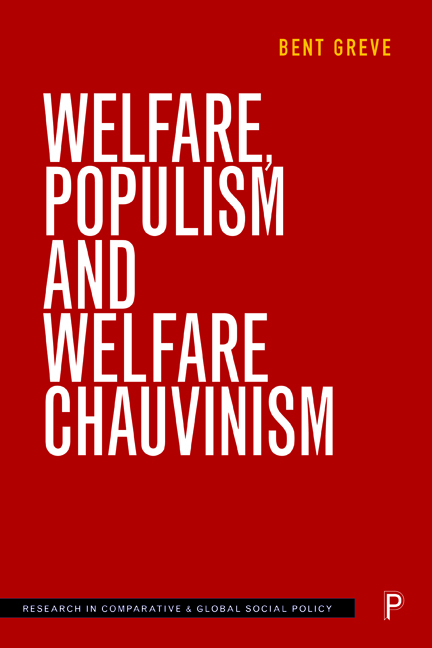Book contents
- Frontmatter
- Contents
- List of tables and figures
- Preface from the series editors
- Preface
- 1 What is it all about?
- 2 Basic concepts
- 3 Why inequality matters
- 4 Dualisation and the labour market
- 5 What form has the development in welfare spending taken?
- 6 Has social cohesion been eroded?
- 7 What do we know about citizens’ perception of the welfare state?
- 8 Populism, welfare chauvinism and hostility towards immigrants
- 9 Concluding remarks
- Index
7 - What do we know about citizens’ perception of the welfare state?
Published online by Cambridge University Press: 27 April 2022
- Frontmatter
- Contents
- List of tables and figures
- Preface from the series editors
- Preface
- 1 What is it all about?
- 2 Basic concepts
- 3 Why inequality matters
- 4 Dualisation and the labour market
- 5 What form has the development in welfare spending taken?
- 6 Has social cohesion been eroded?
- 7 What do we know about citizens’ perception of the welfare state?
- 8 Populism, welfare chauvinism and hostility towards immigrants
- 9 Concluding remarks
- Index
Summary
Introduction
This chapter deals with citizens’ (and thereby voters’) perception of what welfare states should do and what they do not support, or at least support to a lesser degree, as the responsibilities of the welfare state, using several surveys and studies that have tried to depict this. This is done, first, in the second section, by presenting existing analysis, especially analysis based upon the European Social Survey (ESS) special rotating module in 2008. In the third section, the development is analysed by combining the special module in 2008 with the one in 2016, which is possible because 17 European countries took part in both surveys. As these countries also cover sufficiently large varieties of welfare regimes, it is possible to delve into whether the development has been different in various kinds of welfare state. In the fourth section, other data are presented that, in a variety of ways, provide evidence on support or not to the welfare state. The fifth section then sums up the analysis.
Earlier analysis
Naturally, there are pitfalls and risks from using different surveys as questions can be understood differently in different countries (Chung et al, 2018), but also because recent policy discussions and/or changes in one or more policy areas in a country might have had an impact on the viewpoints of citizens. Furthermore, a single event might influence perceptions, for example, on migrants, as seemingly happened with the refugee crisis in 2015/16. However, a survey is one of the best ways to obtain information, although new approaches are under way. Still, in order to conduct comparative analysis, the use of a survey is a solid method, especially because several surveys have been repeated, making it possible to look into changes over time.
A core issue in the analysis of the ESS data for 2008 was to ask respondents about the government's responsibility to ensure:
1. a job for everyone who wants one;
2. adequate health care for the sick;
3. a reasonable standard of living for the old;
4. a reasonable standard of living for the unemployed;
5. sufficient childcare services for working parents; and
6. paid leave from work for people who temporarily have to care for sick family members.
- Type
- Chapter
- Information
- Welfare, Populism and Welfare Chauvinism , pp. 115 - 136Publisher: Bristol University PressPrint publication year: 2019



